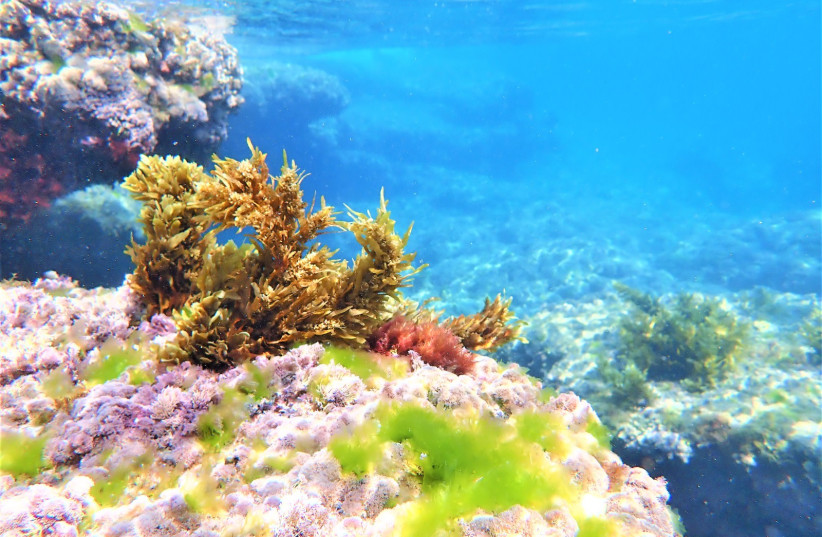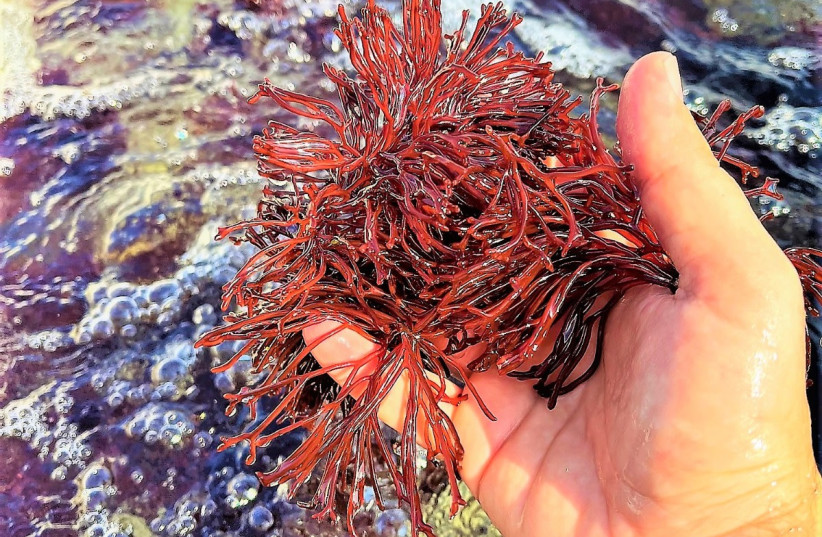New Israeli tech could lead to anti-cancer, anti-diabetic, anti-inflammatory, anti-viral and antibiotic treatments.
Published: MARCH 20, 2023

(photo credit: DORON ASHKENAZI)
Seaweed is a superfood, with health, medicinal, pharmaceutical and cosmetic benefits just for the asking – or by pulling it up from the sea. It is commonly found as thick growths on rocky shores or accumulations in shallow water at about 50 meters or less.
An innovative study conducted by Tel Aviv University (TAU) and the Israel Oceanographic and Limnological Research Institute (IOLR) in Haifa has succeeded in dramatically increasing the health and medicinal value of seaweed, so that it can be used in industries. To make maximum use of it, the ability of seaweed to produce healthy natural substances in larger amounts is necessary.
The advanced new technology promotes an environmentally friendly approach of “sustainable integrated aquaculture” in which the seaweed purifies the water and maintains the ecological balance. The researchers significantly increased the ability of seaweed to produce beneficial natural compounds and materials from underwater plants.
The current study focused on enhancing the production of bioactive compounds such as antioxidants whose concentration was doubled; natural sunscreen concentrations tripled; and unique protective pigments of great medical value that were intensified by 10-fold.
The innovative and sustainable approach of integrated aquaculture combines seaweed with fish cultivation, upgrading the aquatic plant while at the same time helping to purify the seawater and minimizing negative environmental impacts.
Enhanced seaweed, cultivated using the novel research method. (credit: DORON ASHKENAZI)
The team members believe that in the future, it will be possible to raise additional natural materials in seaweed with important medical properties, such as anti-cancer, anti-diabetic, anti-inflammatory, antiviral and antibiotic substances. The new technique has the potential to be applied in the global seaweed aquaculture industry and help promote Israel as a leading power in seaweed biotechnology.
The study was led by doctoral student Doron Ashkenazi of TAU and the IOLR, under the guidance of Prof. Avigdor Abelson of TAU’s School of Zoology and IOLR Prof. Alvaro Israel, in collaboration with other leading researchers from Israel and around the world, including Guy Paz from the institute; organic chemistry expert Dr. Shoshana Ben-Valid; Dr. Eitan Salomon from the National Center for Mariculture in Eilat; and Prof. Félix López Figueroa, Julia Vega, Nathalie Korbee and Marta García-Sánchez from Spain’s Malaga University.
The article was published in the scientific journal Marine Drugs under the title “Enhancing Bioproducts in Seaweeds via Sustainable Aquaculture: Antioxidant and Sun-Protection Compounds.”
“Seaweed, also known as macroalgae, are marine plants that form the basis of the coastal marine ecosystem,” Ashkenazi explained. “The seaweed absorbs carbon dioxide and releases oxygen into the environment and purifies the water, providing food, habitat and shelter for numerous species of fish and invertebrates. Not many are aware of the fact that seaweed produces a wide variety of distinct bioactive compounds that are beneficial to humans. Living in the intertidal zone, they face extreme stress conditions that include changes in salinity, temperature and desiccation [loss of moisture] conditions, changes in the availability of nutrients and high exposure to solar radiation, especially in the ultraviolet (UV) range.”
The survival
To survive, seaweed developed a unique set of chemical defense mechanisms – natural chemicals that help them cope with these harsh environments. They are highly efficient natural factories for the production of valuable substances that could offer significant benefits to mankind.
In a previous study, the same group of researchers developed an innovative technology that enables the growth of seaweed enriched with proteins and minerals such as zinc, iron, iodine, magnesium and calcium. In the new study, they wanted to know whether and how it was possible to increase and maximize seaweed production of bioactive compounds and secondary metabolites.
To this end, they developed an original and practical cultivation approach in which three local seaweed – Ulva, Gracilaria and Hypnea – were initially grown alongside fish effluents and then exposed to various stressors including high irradiance, nutrient starvation and high salt content.
They studied how these changes affected the concentration of specific valuable biomaterials in the seaweed so they could enhance their production. The results were impressive. “We in fact produced ‘super seaweed,’ tailor-designed to be used by the emerging health industries for food and health applications,” Ashkenazi said.
The researchers noted that seaweed aquaculture is environmentally friendly, preserving the ecological balance and reducing environmental risks by minimizing excessive amounts of pollutants caused by man, reducing the emission of greenhouse gases and lowering the carbon footprint. In this way, seaweed aquaculture can help humanity cope with global environmental challenges such as pollution, habitat loss and the climate crisis.
In the future, “humanity will focus on creating science-based environmental solutions like the one we offer in this research,” Ashkenazi said: “technologies that promote recycling and the sound use of natural resources without over-exploiting them. The study shows how we can enjoy nature without harming it.”

